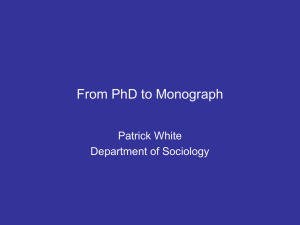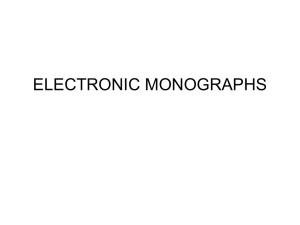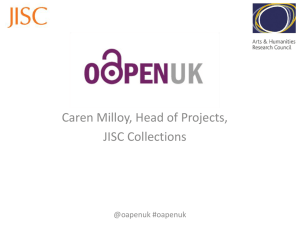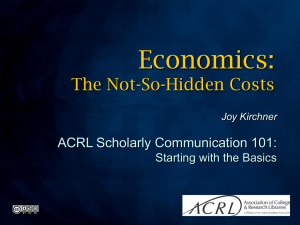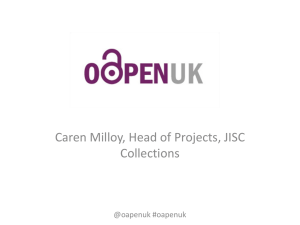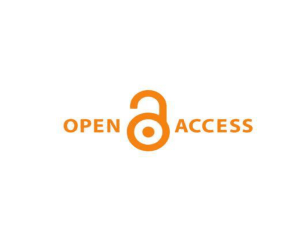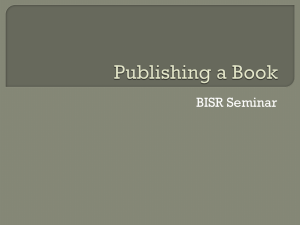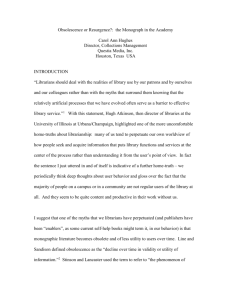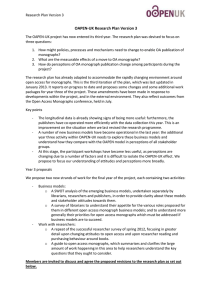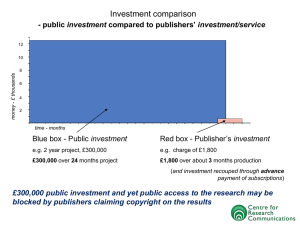read the article here - JISC e
advertisement
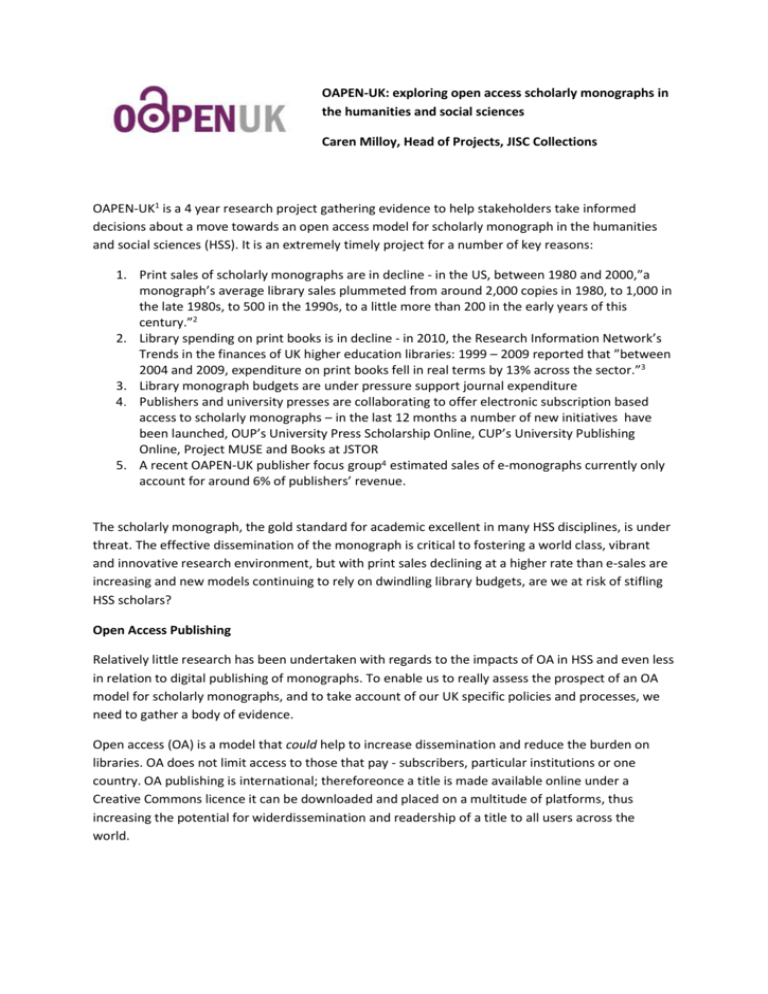
OAPEN-UK: exploring open access scholarly monographs in the humanities and social sciences Caren Milloy, Head of Projects, JISC Collections OAPEN-UK1 is a 4 year research project gathering evidence to help stakeholders take informed decisions about a move towards an open access model for scholarly monograph in the humanities and social sciences (HSS). It is an extremely timely project for a number of key reasons: 1. Print sales of scholarly monographs are in decline - in the US, between 1980 and 2000,”a monograph’s average library sales plummeted from around 2,000 copies in 1980, to 1,000 in the late 1980s, to 500 in the 1990s, to a little more than 200 in the early years of this century.”2 2. Library spending on print books is in decline - in 2010, the Research Information Network’s Trends in the finances of UK higher education libraries: 1999 – 2009 reported that ”between 2004 and 2009, expenditure on print books fell in real terms by 13% across the sector.”3 3. Library monograph budgets are under pressure support journal expenditure 4. Publishers and university presses are collaborating to offer electronic subscription based access to scholarly monographs – in the last 12 months a number of new initiatives have been launched, OUP’s University Press Scholarship Online, CUP’s University Publishing Online, Project MUSE and Books at JSTOR 5. A recent OAPEN-UK publisher focus group4 estimated sales of e-monographs currently only account for around 6% of publishers’ revenue. The scholarly monograph, the gold standard for academic excellent in many HSS disciplines, is under threat. The effective dissemination of the monograph is critical to fostering a world class, vibrant and innovative research environment, but with print sales declining at a higher rate than e-sales are increasing and new models continuing to rely on dwindling library budgets, are we at risk of stifling HSS scholars? Open Access Publishing Relatively little research has been undertaken with regards to the impacts of OA in HSS and even less in relation to digital publishing of monographs. To enable us to really assess the prospect of an OA model for scholarly monographs, and to take account of our UK specific policies and processes, we need to gather a body of evidence. Open access (OA) is a model that could help to increase dissemination and reduce the burden on libraries. OA does not limit access to those that pay - subscribers, particular institutions or one country. OA publishing is international; thereforeonce a title is made available online under a Creative Commons licence it can be downloaded and placed on a multitude of platforms, thus increasing the potential for widerdissemination and readership of a title to all users across the world. OAPEN-UK, follows on from the recent European project, Open Access Publishing in European Networks (OAPEN)5 and is taking an evidence based approach to gathering data, investigating attitudes and perceptions and gathering impacts. Introducing OAPEN-UK OAPEN-UK is collaborating with publishers, authors, research funders, academics and institutions to gather evidence to help stakeholders make some informed decisions about how they may work towards an OA model for HSS monographs, if indeed it is feasible.It is piloting the OAPEN model, where a PDF version of the title is made available in OA using a Creative Commons licence, with the publisher also makingavailable the print version for sale to help recoup costs. This hybrid model recognises that a move to OA will not happen overnight and that while a transition takes place, publishers will continue to publish print – just as academics will continue to read print and want print versions for reward and recognition. Palgrave Macmillan, Taylor & Francis, Berg Publishers, Liverpool University Press and University Wales Press are all participating in OAPEN-UK and have had HSS scholarly monographs selected for inclusion in the pilot6, which commenced on the 1 September 2011. For each monograph title submitted, the publisher had to submit a matched title to make a pair. The titles were matched as closely as possible on publication date, subject area, age to print sales ratio, price and format history. A total of 60 HSS scholarly monographswere selected, making 30 pairs. A title from each pair has been randomly placed in either the Experimental Group or the Control Group.The Experimental Group titles are available on the OAPEN Library under a Creative Commons licence. In addition, the titles can be made discoverable via the publisher’s own website, institutional repositories, the authors own website and via a 100% view in Google Book Search. The Control Group titles are available as ebooks for sale under the publishers normal licensing and route to market models. The titles are discoverable as per the publisher’s standard processes, but only a 10% preview in Google Book Search. For both the Experimental Group titles and the Control Group titles, libraries and readers will be able to purchase print copies and where the publisher is making them available, ebook device friendly editions such as ePub. The pilot will allow sales and usage data to be gathered for the experimental and control group titles and to evaluate differences between the groups. OAPEN-UK Research Plan A large programme of research7is being undertaken as part of the project, thisincludesannual benchmarking surveys, focus groups, interviews and surveys with key stakeholders. By combining the quantitative data from the pilot with sales and usage data, three key questions will be addressed: 1. How might policies, processes and mechanisms need to change to enable OA publication of monographs? a. What is the most appropriate business model for OA monographs? b. What is the impact on organisational policies? c. What technical changes may be required in order to move to OA? 2. What are the measurable effects of a move to OA monographs? a. On readership/usage? b. On sales? c. On citations? 3. How do perceptions of OA monograph publication change among participants during the project? a. Perceived risks and benefits to various stakeholders of publishing in OA format? b. Perceived quality of OA monographs? Year 1 of the plan includes an initial literature review, an annual benchmarking survey, focus groups and initial scoping interviews / surveys. Current Findings The first annual benchmarking survey (which will track the changing opinions of all project participants - authors, publishers, AHRC, JISC, members of the steering group towards OA monograph publication) and the first round of focus groups have now been completed. Focus groups have been held with publishers, researchers (as both authors and readers), institutional representatives (including librarians, IR staff and research managers), learned societies, ebook aggregators and research funders.Key themes that arose included metadata, versioning, preservation, delivery and the user experience, quality and prestige, business models and risks and consistency. The findings8 are being used to define the next set of activities – surveys and in-depth interviews. The OAPEN-UK researcher survey9(running until 16 April 2012) explores many of the themes from the focus groups in more depth. In particular it looks at researcher’s attitudes towards OA, the value they place on being published and their publishers, the viability of business models and their reading behaviours. In summer 2012 OAPEN-UK will make available the analysis of the sales, usage and citation data alongside the full write up of the focus groups, survey results and interviews.As the project progresses, all the evidence gathered will provide a comprehensive examination of OA as a potential model and enable stakeholders to make informed decisions about the future of the scholarly monograph. Further information A guide for librarians10and IR managers11includesa full title list, instructions to download MARC records, author affiliation and how to can get involved. Details on the project, the full research plan, events and latest news are available on the OAPEN-UK website1. The project can be followed on twitter: @oapenuk #oapenuk or contact c.milloy@jisccollections.ac.uk for further information. References 1. OAPEN-UK: http://oapen-uk.jiscebooks.org/ 2. Willinsky, J.,(2010) Towards the Design of an open Monograph Press.Journal of Electronic Publishing, 12, 1. doi: 10.3998/3336451.0012.103 3. Research Information Network (2010) Trends in the finances of the UK higher education libraries: 1999–2009. http://www.rin.ac.uk/uk-libraries-trends 4. OAPEN-UK publisher focus group: http://oapen-uk.jiscebooks.org/research-findings/y1initial-focus-groups/publishers/ 5. OAPEN: http://project.oapen.org/ 6. OAPEN-UK pilot: http://oapen-uk.jiscebooks.org/pilot 7. OAPEN-UK research plan: http://oapen-uk.jiscebooks.org/overview/research-plan/ 8. OAPEN-UK focus groups: http://oapen-uk.jiscebooks.org/research-findings/y1-initial-focusgroups/ 9. OAPEN-UK researcher survey: http://www.surveymonkey.com/s/oapenukresearcher 10. OAPEN-UK guide for librarians: http://oapen-uk.jiscebooks.org/pilot/info-for-librarians/ 11. OAPEN-UK guide for IR managers: http://oapen-uk.jiscebooks.org/pilot/info-for-repositorymanagers/
